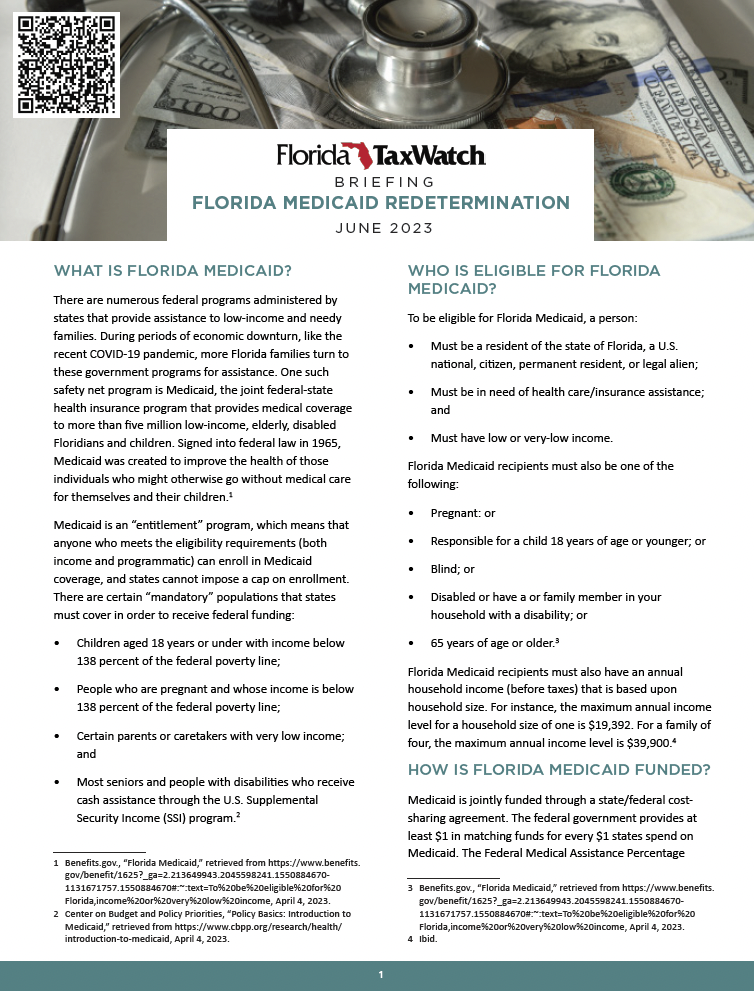Florida Medicaid Redetermination
 Medicaid is an “entitlement” program, which means that anyone who meets the eligibility requirements (both income and programmatic) can enroll in Medicaid coverage, and states cannot impose a cap on enrollment. There are certain “mandatory” populations that states must cover in order to receive federal funding:
Medicaid is an “entitlement” program, which means that anyone who meets the eligibility requirements (both income and programmatic) can enroll in Medicaid coverage, and states cannot impose a cap on enrollment. There are certain “mandatory” populations that states must cover in order to receive federal funding:
Children aged 18 years or under with income below 138 percent of the federal poverty line;
People who are pregnant and whose income is below 138 percent of the federal poverty line;
Certain parents or caretakers with very low income; and
Most seniors and people with disabilities who receive cash assistance through the U.S. Supplemental Security Income (SSI) program.
Florida’s plan to conduct Medicaid redeterminations is designed to return business operations to “normal” while ensuring that eligible individuals continue to receive Medicaid coverage and ineligible individuals are referred to other coverage where possible. In the process, however, an estimated 900,000 or more Floridians stand to lose their Medicaid coverage, as many as 388,000 of which may have no known affordable alternative.
In the longer term, the legislature must decide how to address the potential reality of up to 300,000 or more Floridians losing their Florida Medicaid coverage and, with it, access to needed care. It is doubtful that those who fall into the coverage gap will be able to afford health insurance coverage through the ACA Marketplace absent some form of financial assistance. Individuals who do not receive some form of premium subsidies or other financial assistance to get coverage through the Marketplace are likely to face higher commercial insurance premium rates as providers “cross subsidize” to make up for losses on uncompensated care.
Those adults in the coverage gap that remain uninsured will be more likely to postpone needed care because they cannot afford it. Those uninsured Floridians who do seek medical care will undoubtedly place additional pressure on the “safety net” hospitals that have traditionally provided care to those who are uninsured, and on emergency rooms that, by law, must provide adequate care for situations that meet federal guidelines for what constitutes an emergency situation.
Medicaid expansion is a good deal for those states that take that route—the federal government funds 90 percent of the costs of expansion enrollees and additional financial incentives are available through the American Rescue Plan—as long as the federal funding for the expansion remains available to the states. Florida TaxWatch cautions against the traditional Medicaid expansion for several reasons. First, higher than projected enrollment and higher per-person costs have generated significant cost overruns in states that have expanded their Medicaid programs. Second, significant enrollment increases coupled with a reluctance on the part of some doctors to accept new Medicaid patients is a prescription for longer wait times and poorer patient outcomes. Finally, there is the uncertainty about future costs and the fiscal impact on the state’s budget, of which Medicaid already accounts for more than one-third. Reducing the percentage of expansion costs paid by the federal government would be a “budget buster” for Florida and other states.
Floridians who earn too much to qualify for Medicaid, but too little to qualify for ACA Marketplace plans, can get financial assistance to purchase a plan through the ACA Marketplace. Unlike Medicaid and other federal safety net programs— eligibility for which is based on current income—eligibility for ACA Marketplace subsidies is based on a projection of the applicant’s next year income. When purchasing a Marketplace healthcare plan, an applicant needs only to estimate “in good faith” that their next year income will be at or above the federal poverty level. If the next year income is below the federal poverty level, there would be no financial penalty or payback required unless the estimate was made with an “intentional or reckless disregard for the facts.”
Until the state has a clearer picture of the number of Floridians who remain in the coverage gap, it is difficult to suggest any specific measures to close the coverage gap. In the short term, to make the Medicaid redetermination process go as smoothly as possible, Florida TaxWatch encourages individuals with Florida Medicaid coverage to:
Log on to the state’s integrated online Self-Service Portal (https://members.flmedicaidmanagedcare.com/login) and make sure all the information is correct and up-to-date; and
If contacted by the DCF, timely respond to redetermination notices.